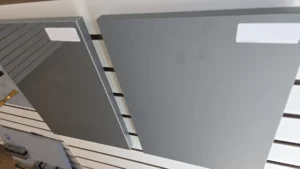Plywood, a sheet material crafted from thin layers of wood veneer, represents a cornerstone in the family of manufactured boards, which includes medium-density fiberboard (MDF) and particle board. Engineered through the strategic arrangement of wood grains and bonding with resin, plywood offers a multitude of types, each tailored for specific applications. In this guide, we explore the diverse plywood types and their uses across various industries.
Basic Types of Plywood:
- Commercial MR Grade:
- Intended for internal use.
- Suitable for applications where moisture resistance is not a primary concern.
- Waterproof BWR Grade:
- Designed for exterior use.
- Exhibits enhanced water resistance, making it suitable for outdoor applications.
- Marine Plywood:
- A superior grade designed for boats and ships.
- Exceptionally resistant to water, ideal for prolonged exposure to marine environments.
Types Based on Wood Used:
- Hardwood Plywood:
- Crafted from harder and stronger woods like teak, gurjan, and birch.
- Offers superior durability and strength.
- Softwood Plywood:
- Made from lighter and weaker woods such as cedar, spruce-pine-fir (SPF), or mango wood.
Other Specialized Plywood Types:
- Flexible Plywood (Flexiply):
- Pliable and can be rolled up.
- Ideal for creating rounded shapes in furniture and design.
- Film-Faced Shuttering Plywood:
- Industrial-grade plywood suitable for construction.
- Features a film coating for added durability and resistance to elements.
- Structured Plywood:
- Tailored for industrial applications requiring structural strength.
- Fire Retardant Plywood (FR Grade):
- Treated with fire-resistant chemicals.
- Applied in public spaces like theatres, malls, shopping complexes, and restaurant kitchens.
- Marine Grade Plywood:
- Specifically engineered for boats and ships.
- Resistant to water and ideal for marine applications.
- Termite Resistant and Borer Proof Plywood:
- Treated to withstand termites and borers.
- Ensures longevity and durability.
- Structural Plywood:
- Designed for construction applications where structural stability is crucial.
Plywood Types according to Trees:
- Gurjan Plywood:
- Utilizes gurjan wood, known for its strength and durability.
- Teak Plywood:
- Incorporates teak wood, prized for its aesthetic appeal and resistance to decay.
- Redwood Plywood:
- Features redwood, offering a distinct appearance and natural durability.
- SPF Plywood:
- Crafted from spruce-pine-fir wood, balancing strength and versatility.
Flexible Plywood (Flexiply):
- Ideal for creating curved and rounded shapes in furniture and design.
FR Grade (Fire Resistant):
- Used in public spaces to delay the burning process.
Marine Grade:
- Engineered for boats and ships, providing unparalleled water resistance.
Termite Resistant and Borer Proof:
- Treated to withstand termites and borers, ensuring durability.
Structural Plywood:
- Tailored for construction applications where structural stability is essential.
Plyboost:
A leading plywood supplier and manufacturer from China, offering a comprehensive range of plywood products.
In conclusion, plywood’s versatility, coupled with its varied types, positions it as a foundational material in construction, furniture making, and various design applications. Understanding the specific attributes of each plywood type empowers consumers to make informed decisions, ensuring the right choice for diverse projects and requirements. Whether it’s the water resistance of marine-grade plywood or the flexibility of flexiply, plywood continues to be a reliable and adaptable material across industries.
Related blogs

An Analysis of the Advantages and Disadvantages of Different Edge Treatment Methods for Melamine Plywood
Melamine plywood, a material widely used in furniture manufacturing, interior decoration, and other fields, has

Additives Used in Plywood Glue: Functions and Benefits
Additives are essential in plywood glue formulations, enhancing the performance, durability, and environmental friendliness of

Synchro Plywood: A High-Quality Composite for Realistic Wood Finishes
What is Synchro Plywood? Synchro Plywood is an innovative composite material designed to emulate the

The 5 Best Kitchen Cabinet Materials: Pros and Cons
Choosing the right material for your kitchen cabinets is essential for both style and durability.
